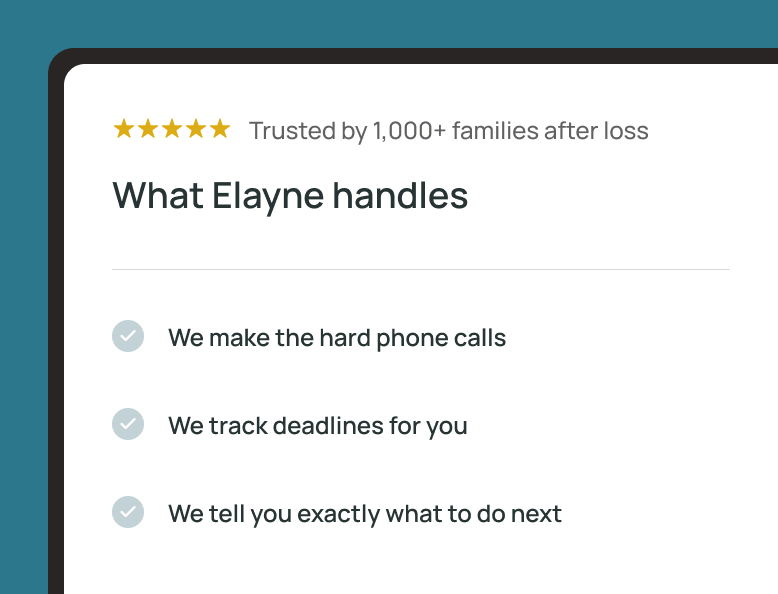Beyond the emotional toll, settling an estate involves tax rules that many people have never encountered. Knowing the basics can help you navigate the process with more clarity and confidence.
When a family member passes away, you’re faced with decisions and responsibilities that can feel overwhelming.
There are legal and financial steps to manage, often with complicated rules and unfamiliar timelines. In the middle of it all, one of the most confusing parts is understanding the relevant taxes.
This guide explains what estate and inheritance taxes are, how they work, and how to handle them during the settlement process. While it is not legal, medical, financial or tax advice, if you have authority to act, it will give you a solid foundation to make informed decisions and work better with the professionals who guide you through the process.
Understanding the Basics
What are estate and inheritance taxes?
Both taxes apply to assets that someone leaves behind. The difference is in who pays and how much is owed.
Estate tax: Based on the value of everything the deceased owned. This tax is paid from the estate before any assets are distributed to heirs.
Inheritance tax: Paid by the person receiving the inheritance. The amount depends on the size of the inheritance and the recipient’s relationship to the deceased.
When do taxes apply?
- Federal estate tax: At the federal level, most estates do not owe any estate tax. For 2025, the federal threshold is $13.99 million per individual. You can find the official IRS page on estate taxes here.
- Federal inheritance tax: There is no federal inheritance tax.
- State estate tax: Some states tax the estate.
- State inheritance tax: Some states tax the person receiving the inheritance. Only one state currently has both estate and inheritance taxes.
You can find a full state-by-state breakdown here.
It’s important to note that even if you live in a state with no inheritance tax, the laws of the state where your loved one lived or owned property could still come into play. A professional can help you understand what applies in your situation.
How Estate and Inheritance Taxes Fit into the Estate Settlement Process
Estate and inheritance taxes are just one part of the larger estate settlement, and usually take months to complete. Understanding where taxes fit into that timeline helps make the entire process feel more manageable.
In general, the steps of settling an estate after a death include:
- Probate: The legal process that confirms the will and appoints someone to manage the estate.
- Asset valuation: An inventory that lists what the person owned and determines the value of each asset.
- Debt settlement: Paying any outstanding loans, credit cards, or other financial obligations.
- Tax filings: Submitting the deceased person’s final income tax return and, if applicable, any required estate or inheritance tax filings.
- Distribution of assets: Once all taxes and debts have been settled, the remaining assets are distributed according to the will or applicable law.
The person managing this process is called the executor. Their role includes gathering records, filing paperwork, and ensuring that legal requirements are met.
Because tax filings rely heavily on accurate asset valuations and complete financial records, staying organized from the start helps prevent unnecessary delays or complications later on. This is also a key aspect of Elayne’s mission, and how we support families and executors. Our platform simplifies what needs to be gathered, and helps make sure that nothing important gets missed.
What Documents to Gather When Handling Estate and Inheritance Taxes
You don’t need to have everything at once, but collecting certain documents early can save time and allow professionals to work more efficiently. It also helps ensure that nothing important is missed during tax filings or asset distributions.
Documents to gather when starting to handle estate and inheritance taxes include:
- The will or trust document, if available
- A death certificate
- Bank and investment account statements
- Retirement accounts and pension record
- Property records
- Any debts or outstanding bills
- Life insurance policy details
- Contact information for financial institutions or advisors
Having this paperwork ready helps create a complete picture of the estate. It also makes it easier to identify what needs to be filed, what taxes might apply, and where to focus first.
If you’re feeling overwhelmed by this process, Elayne can help. Our Care Managers are experts at guiding families through each step and making sure the right documents are collected and organized. That way, when you’re ready to work with a lawyer or accountant, much of the paperwork is already complete.
Getting Help Along the Way
Even when an estate seems simple, the steps can quickly become complicated. Tax rules change, vary by state, and often depend on the assets involved and who inherits them. That’s where Elayne’s Care Managers help families stay on track. They guide you through what needs to be gathered, answer questions, and help you stay organized as you work through each step.
By having documents and information prepared ahead of time, it becomes much easier for attorneys, accountants, and tax professionals to handle filings, meet deadlines, and apply the right legal and tax standards. Elayne helps families do the upfront work so that licensed professionals can focus on resolving the more technical parts of the estate.
Why This Process Is So Important
At times, estate settlement may feel like a long list of forms and legal steps. But at its core, this process exists to protect your loved one’s wishes and to make sure that assets are handled correctly. Getting it right can have a lasting impact on the people the estate was meant to support.
For many, an inheritance may go toward maintaining a family home, paying for education, supporting a business, or providing financial stability.
By understanding how estate and inheritance taxes fit into the broader process, and preparing carefully, you help ensure that your loved one’s legacy is protected and passed on as intended.
Final Thoughts
Estate and inheritance taxes are often the piece of estate settlement that feels the most confusing. But with the right preparation, clear information, and professional guidance, this process becomes much more manageable.
Remember, you don’t need to know everything at the start. You just need to take things step by step, ask questions, keep key documents organized, and involve the right professionals as you move through each step.
This guide was designed to give you that starting point. With a stronger understanding of how taxes fit into the estate settlement process, you can approach what comes next with greater confidence, clarity, and peace of mind.
*Disclaimer: This article is for informational purposes only and does not provide legal, medical, financial, or tax advice. Please consult with a licensed professional to address your specific situation.















































